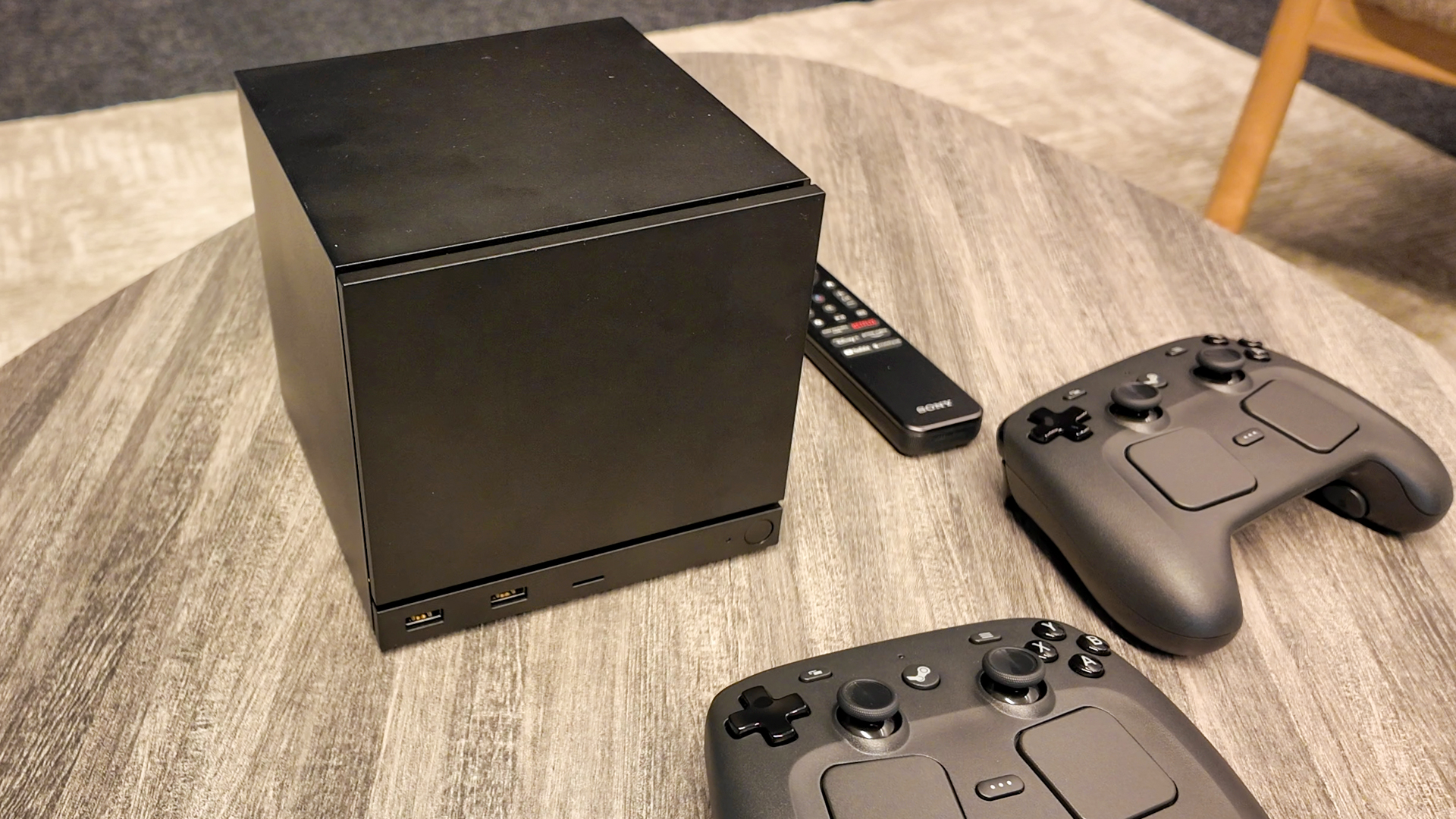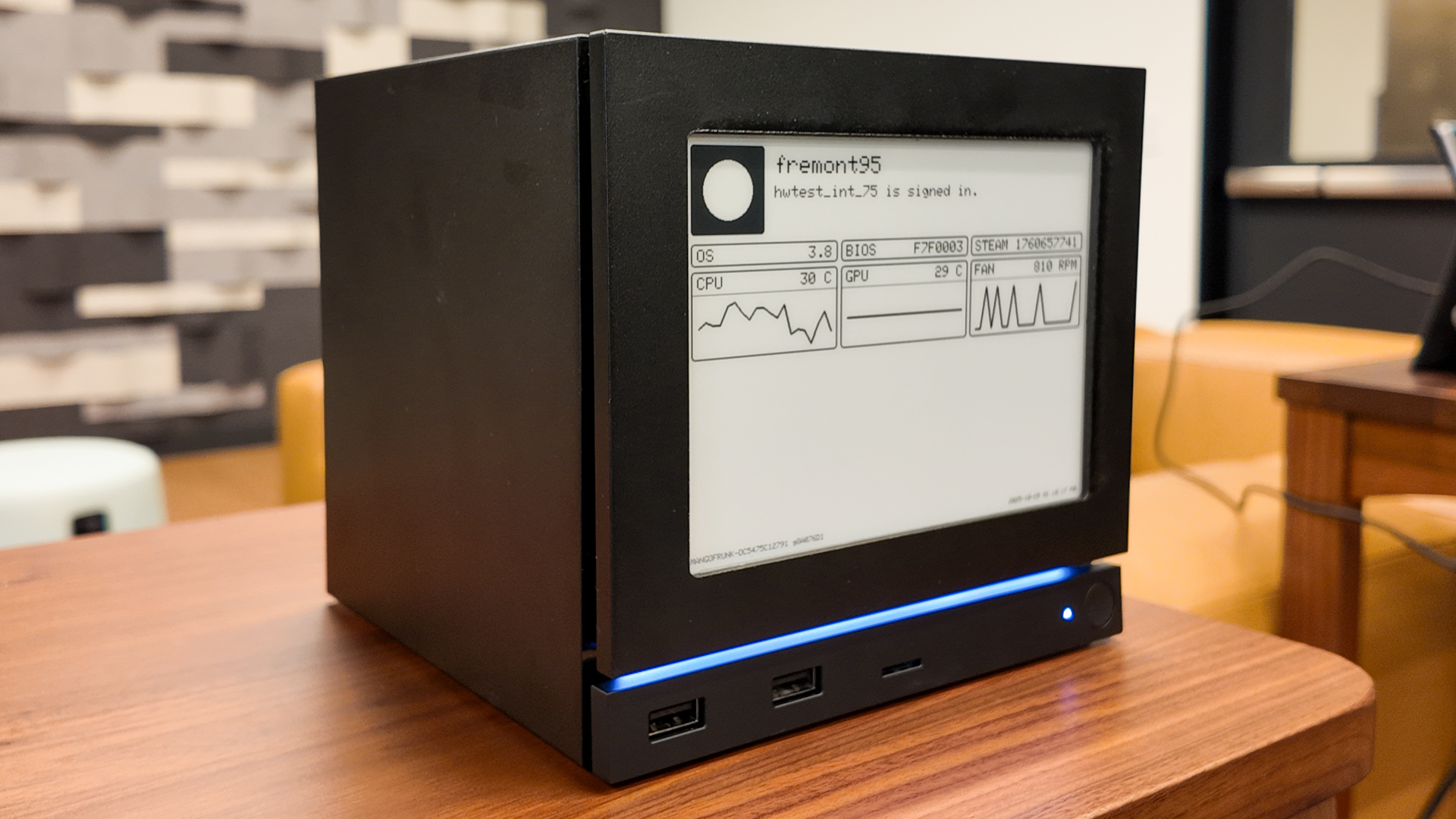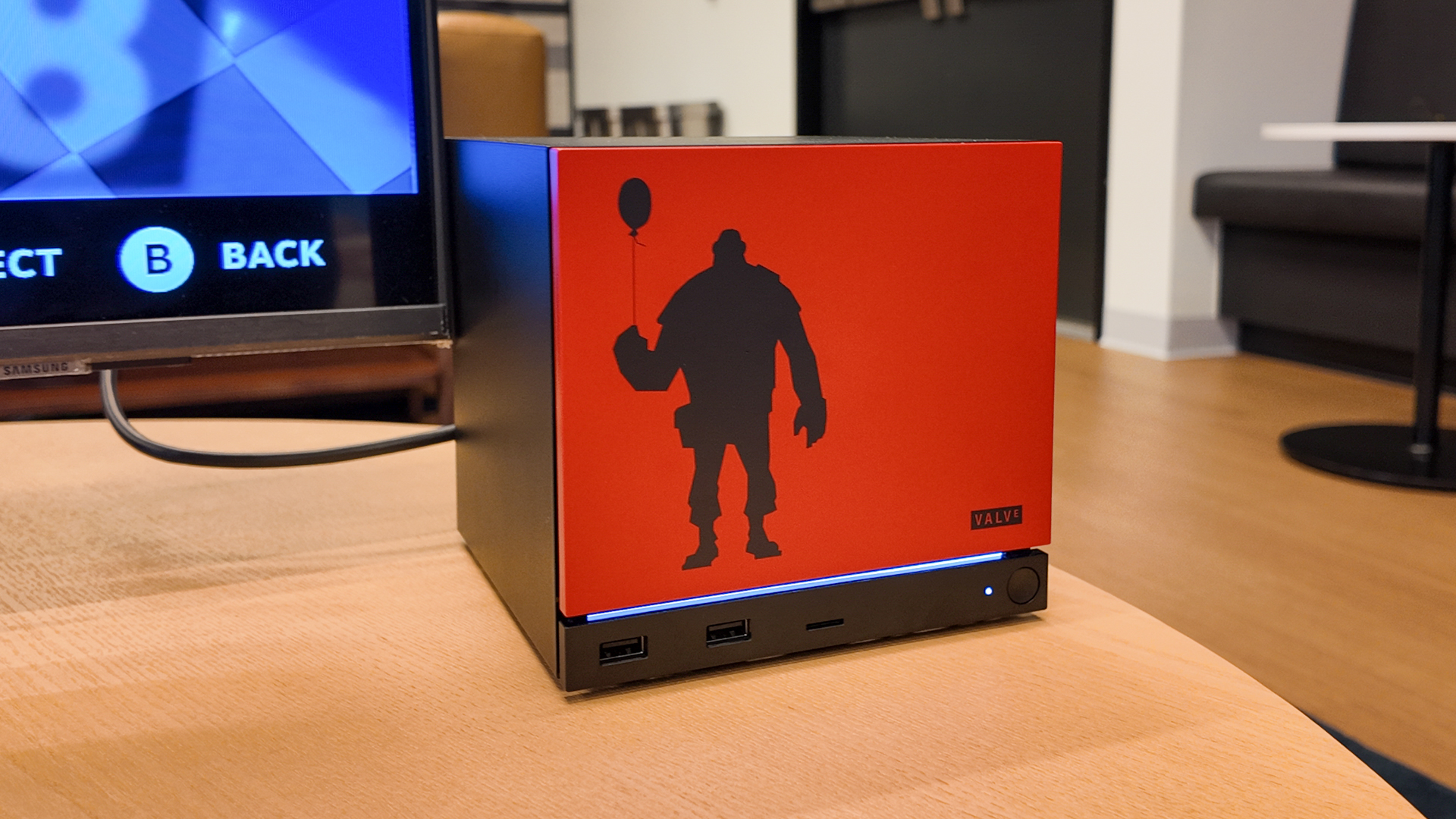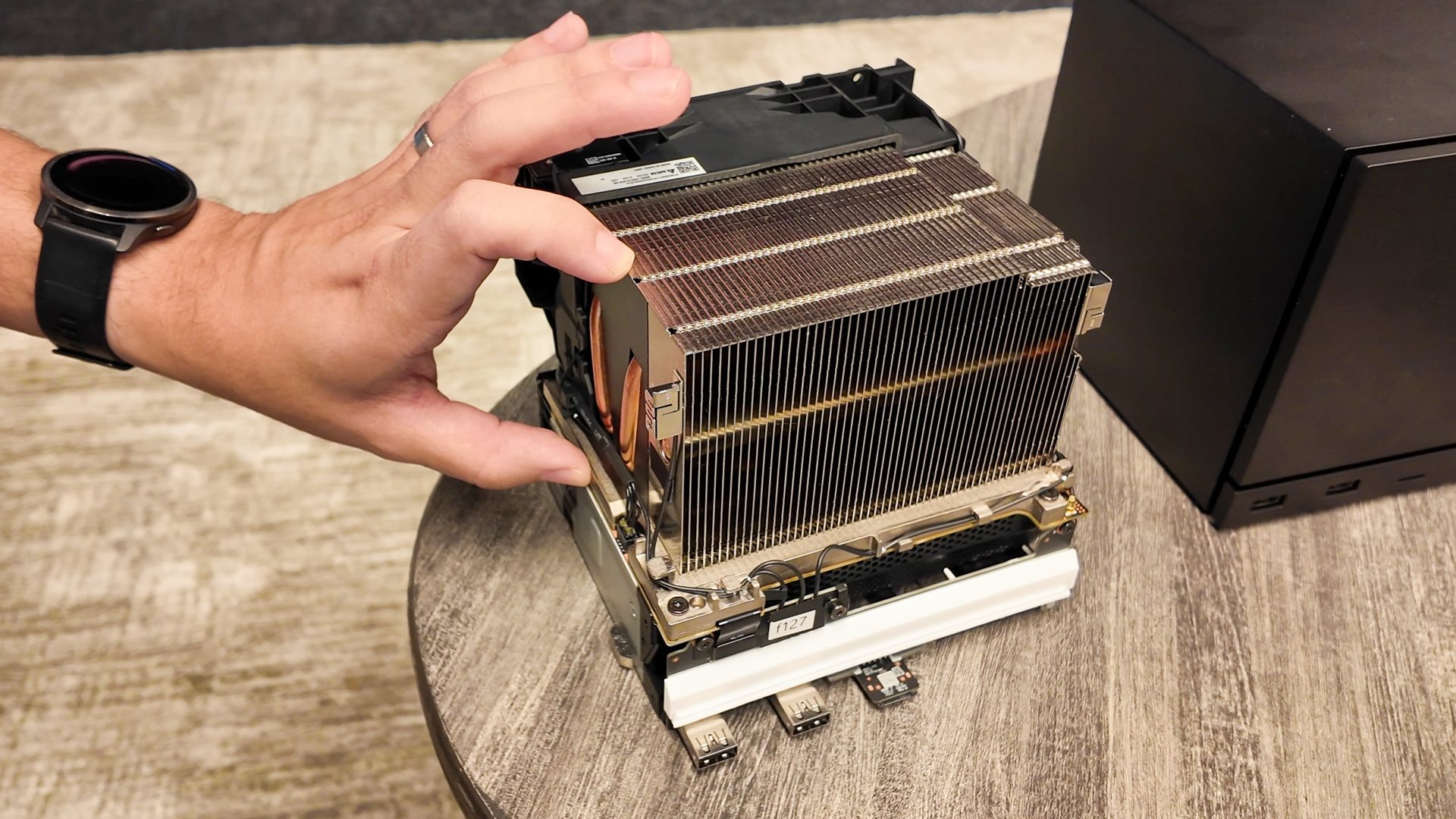Valve's Steam Machine may look a bit like the Borg Cube, but it's still the friendliest face of PC gaming I've seen yet
Is Valve picking up the ball console gaming dropped?

Keep up to date with the most important stories and the best deals, as picked by the PC Gamer team.
You are now subscribed
Your newsletter sign-up was successful
Want to add more newsletters?

Every Friday
GamesRadar+
Your weekly update on everything you could ever want to know about the games you already love, games we know you're going to love in the near future, and tales from the communities that surround them.

Every Thursday
GTA 6 O'clock
Our special GTA 6 newsletter, with breaking news, insider info, and rumor analysis from the award-winning GTA 6 O'clock experts.

Every Friday
Knowledge
From the creators of Edge: A weekly videogame industry newsletter with analysis from expert writers, guidance from professionals, and insight into what's on the horizon.

Every Thursday
The Setup
Hardware nerds unite, sign up to our free tech newsletter for a weekly digest of the hottest new tech, the latest gadgets on the test bench, and much more.

Every Wednesday
Switch 2 Spotlight
Sign up to our new Switch 2 newsletter, where we bring you the latest talking points on Nintendo's new console each week, bring you up to date on the news, and recommend what games to play.

Every Saturday
The Watchlist
Subscribe for a weekly digest of the movie and TV news that matters, direct to your inbox. From first-look trailers, interviews, reviews and explainers, we've got you covered.

Once a month
SFX
Get sneak previews, exclusive competitions and details of special events each month!
'Tis true, sire—the Steam Machine rides again. No longer simply issuing specs and outsourcing the rest, Valve is set to fully realise what was at best a half-formed vision more than a decade ago, while also fortifying its existing hardware successes. Valve has introduced a number of new branches to its hardware ecosystem, including the aforementioned PC-for-the-TV device. But who is it for? And is Valve really angling for a slice of the console market?
While we know the Steam Machine will release early next year, we don't yet know how much it will go for—but I'm feeling hopeful it could be an affordable, accessible option for the PC gaming-curious. I've said it before, and I'll say it again: PC gaming is an expensive hobby. After the not small upfront cost of building your very first rig, there's the regular rhythm of pricey hardware upgrades (to say nothing at all about the cost of repairs and replacement parts).
So, could the Steam Machine corner the market of folks curious about the power and customisability of PC gaming, but who still want to hit the ground running when it comes to gaming? Given that the bog-standard PS5 now costs $550 and the price of a 1TB Xbox X has climbed up to $650, what would a compelling price point for new hardware like the Steam Machine look like in this day and age anyway? And is modern console gaming really a fair comparison point when the technical makeup of the Steam Machine itself skews closer to a mini-PC with a discrete GPU?
I'm not just asking for myself, someone who finally upgraded to her first gaming rig only after relying on an elderly gaming laptop for a decade. I'm asking for my Mum, who is still in part relying on an HP Pro 3010 Microtower machine from 2009. Even worse, it's also a Windows 10 machine.
Now, lest you think I'm trying to foist Valve's Linux-based SteamOS PC onto someone who'd have no use for it, let me explain: I only confronted my mum's dire hardware straits recently, when I got the bright idea to see if her PC could run Steam. Before, I'd spent years poorly packing my pointy PS5 into a bag and lugging that all the way home.

Most recently, Mum has been all about solving the conundrum of how to get away with murder in Overboard, but she also sat through—and even at points enjoyed—watching me play 40 hours of crime drama Yakuza 0. Granted, neither of us were particularly fond of how the female characters were written in that '80s-set prequel—though I approached it from the perspective of someone who has only ever read about the decade, whereas my Mum not only lived it but was also working one of those newfangled computer science jobs at the time.
My Mum is more than curious about games, but she lacks the hardware to pursue the interest. Mum's a coder, building bridges between clients and databases, which not only takes a tremendous amount of time but can often be built just fine on a system with an underpowered, integrated graphics chip (the horror). As such, she's been far too busy to investigate all that a discrete GPU could offer—besides, her 2009 desktop ain't broke, it just gives her ample time to get a brew while it contemplates booting.
Keep up to date with the most important stories and the best deals, as picked by the PC Gamer team.
Somewhat selfishly, I'm looking for a solution that means I don't have to lug hardware all over the shop and will save my poor back. Thankfully, the Steam Machine is interoperable with the Steam Deck, meaning for one thing you can connect four of the handhelds via the dedicated antenna on the tiny PC. A girl may dare to dream about bringing the whole family into Valve's ecosystem.

Family sharing via Steam is all well and good, but you can also load your Steam games to a microSD card, and then play them on both devices. The option to load my collection to physical media, and then pop that in my Mum's Steam Machine without having to worry about creaky internet download speeds—or, indeed, my creaky back—is a compelling prospect.
Basically, I'm hoping the Steam Machine makes it easier to share my love of games with those I love. I appreciate that learning how to build a gaming PC can be an intimidating prospect, even if you're already reasonably tech-literate. So, a prebuilt device that's just as happy out of the box on your desktop as it is beside your TV feels distinctly more welcoming. However, not knowing how much Valve will be asking for the Steam Machine definitely pumps the brakes on my gaming schemes.
While I can wish upon a shooting star that Valve's bet on older hardware keeps costs down, the fact of the matter is that our top pick for the best mini-pc with a discrete GPU is the Asus ROG NUC 970—and that costs well over a grand even for the barebones model. If the Steam Machine's pricing rocks up anywhere near the $1,000 mark, that's a discussion with my Mum that's over before it's even begun (and anyone else might as well build their own gaming PC from scratch).
Now, it's not really fair to compare the NUC 970's Nvidia RTX 4070 Mobile card to the Steam Machine's semi-custom AMD RDNA 3 GPU, to say nothing of the NUC's comparative oodles of DDR5 RAM; Asus ROG is pitching towards a decidedly different PC gaming crowd than Valve. However, our best mini-PC pick that's rocking an even somewhat comparable chip is the Minisforum AtomMan G7 PT with its Radeon RX 7600M XT GPU…which also still costs close to a grand for even the barebones model.


Steam Frame: Valve's new wireless VR headset
Steam Machine: Compact living room gaming box
Steam Controller: A controller to replace your mouse
That doesn't mean all hope for an affordable Steam Machine is lost, though. For those who would appreciate the reminder, you can pick up the 512 GB version of the OLED Steam Deck for $550, or get the 1TB version for $650. Naturally, the 256 GB LCD model shakes out cheaper at $400—it's our favoured budget pick for the best handheld gaming PC for that reason.
Mind you, hardware has moved on a bit over the last few years, and though Valve is once again betting on last-gen, proven tech, the Steam Machine is still six times faster than the Steam Deck. Couple that with the fact it's also offering the Steam Machine in both a 2 TB and a likely less pricey 512 GB storage flavour, and I'm not yet convinced Valve has completely disregarded the affordability angle for this device.
Obviously, I don't think it's going to be as cheap as the LCD Steam Deck at $400. Personally, I'm hoping somewhere near the $600 mark is not just blue sky thinking—though if it does go for that little, I will eat my hat and then the console itself.
Whatever price tag the Steam Machine launches with in spring of 2026, I think I've at least got enough ammunition to convince my Mum she at least deserves an upgrade in some form.

Best gaming PC 2025
All our current recommendations






Jess has been writing about games for over ten years, spending the last seven working on print publications PLAY and Official PlayStation Magazine. When she’s not writing about all things hardware here, she’s getting cosy with a horror classic, ranting about a cult hit to a captive audience, or tinkering with some tabletop nonsense.
You must confirm your public display name before commenting
Please logout and then login again, you will then be prompted to enter your display name.


